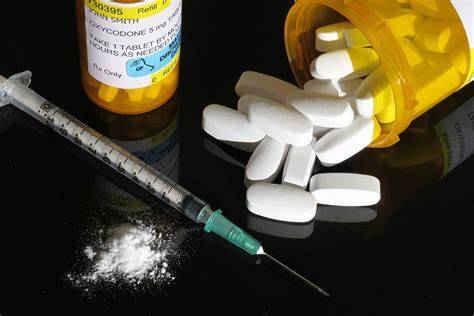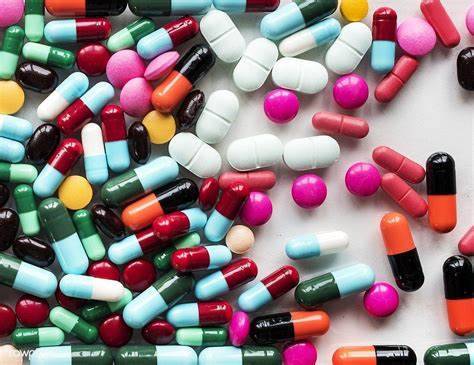#pharmacological treatment
Text
Drug utilization in patients with SARS-CoV-2 in an intensive care unit
Image: Flickr
Article published in J. Pharm. Pharmacogn. Res., vol. 10, no. 6, pp. 977-985, November-December 2022.
DOI: https://doi.org/10.56499/jppres22.1460_10.6.977
Miguel Sevilla Méndez1, Ana M. Téllez López2, Giovanni Gómez Barragán3, Ivette Reyes Hernández2, Claudia Velázquez González2, Isis B. Bermúdez Camps2*
1Departamento de Servicios Farmacéuticos y la Unidad de Cuidados Intensivos…

View On WordPress
#COVID-19#drug utilization study#indication-prescription#intensive care unit#Pharmacoepidemiology#pharmacological treatment
0 notes
Text
4-Hydroxypyridine-3-sulfonic acid

Backed by expert professional, we are engaged as leading 4-Hydroxypyridine-3-sulfonic acid supplier, manufacturer and exporter. We offer best quality pharma intermediates. Its molecular formula is C5H5NO4S and molecular weight is 175.16. Our quality 4-Hydroxypyridine-3-sulfonic acid products is widely demanded across various segments as we offer them as per customer requirement at best price.
#4-Hydroxypyridine-3-sulfonic acid#Pharma Intermediates#Medicine#Laboratory Chemicals#Organic Chemistry#Alternative Medicine#Pharmacist#Pharmacology#Medical Supplies#Medical Treatment
2 notes
·
View notes
Photo


"Cups"
2023
practice
This is a technique for treating a mental disorder with maximum efficiency. Empty containers from a neuroleptic become part of therapy.
#art#contemporary art#cup#Cupping therapy#alternative medicine#psychiatry#antipsychotic#treatment#therapy#mental disorder#medicine#ishonin#pharmacology
5 notes
·
View notes
Text
#drug help#medical treatments#medical student#pharmacology#pharmacy#pharma manufacturing#sciedithub.org#sciedithub
2 notes
·
View notes
Text
🛑 **WARNING on Mixing Lithium (the Psychiatric Medication used to treat Bipolar) with Psilocybin**
Lithium + Psilocybin can cause **Seizures**, read about it here: https://psychedelichealth.co.uk/2021/08/13/mixing-psychedelics-with-lithium-poses-significant-risk-of-seizures/
🦺 **CAUTION on Serotonin Syndrome**
From this article here: https://psychedelicpharmacist.org/ssris-and-psilocybin-therapy-to-taper-or-not/
"Serotonin syndrome (SS) is a potentially life-threatening condition caused by the overactivation of serotonergic receptors in the brain. SS is commonly caused by an interaction between two different serotonergic drugs that both upregulate serotonin signaling in the body. Symptoms of SS can include hypomania, myoclonus, akathisia, diarrhea, fever, dilated pupils, shivering, and tachycardia, as well as other serious clinical symptoms. If left untreated, SS can be deadly. "
Read on to learn more about the different types of anti-depressants and MAOI's to help you decide if mixing Psilocybin experiences while on psychiatric medication is right for you.
🛑 **WARNING on combining Psilocybin with stimulants**
Psilocybin raises heart rate and blood pressure. Adding stimulents into this can cause an synergistic effect, which could be potentially dangerous.
*If you have heart arrythmia, reconsider your use of Psychedelics, or proceed with caution and use a much smaller amount and avoid caffeine or stimulent drugs*
**Stimulent drugs include:**
Cocaine
Meth
And possibly some medications like Albuterol, but I have not (yet) seen studies about that.
**Basically:** *If it is going to raise your blood pressure and heart rate, DO NOT take extra things that also raise your blood pressure and heart rate unless you are experienced, or go low and slow*
#mushrooms#mycolancer#harm reduction#psilocybin#psychonauts#wellness#harm reduction education#drug chemistry#pharmacology#fungi#ssris#SNRIs#pharmaceutical#drug interactions#depression treatment#holistic health#natural medicine
1 note
·
View note
Text









#respiratory health#bone health#mental health#women health#healthcare#digestivehealth#diabetes treatment#pharmacology#pain management#cancer#hypertension
0 notes
Text
Pulmonary Edema

Introduction
Pulmonary edema is a condition that results from the abnormal accumulation of fluid in the lungs, leading to impaired gas exchange and respiratory distress. This comprehensive discourse aims to provide an in-depth analysis of pulmonary edema, covering its pathophysiology, etiology, clinical manifestations, diagnostic modalities, treatment strategies, prevention strategies, and associated complications.
Pathophysiology of Pulmonary Edema

Pulmonary edema develops when there is an imbalance between the hydrostatic and oncotic pressures within the pulmonary vasculature. This imbalance leads to an increase in capillary permeability and the extravasation of fluid into the interstitial space and alveoli of the lungs. Several mechanisms contribute to this process, including increased capillary hydrostatic pressure due to heart failure, increased vascular permeability due to inflammation or injury, and decreased oncotic pressure due to hypoalbuminemia or capillary leak syndrome.
Etiology of Pulmonary Edema
The etiology of pulmonary edema can be categorized into cardiogenic and noncardiogenic causes. Cardiogenic pulmonary edema occurs secondary to heart failure or other cardiac conditions that result in elevated left atrial pressure and pulmonary venous congestion. Noncardiogenic pulmonary edema, on the other hand, is caused by factors unrelated to heart dysfunction, such as acute respiratory distress syndrome (ARDS), aspiration, sepsis, or neurogenic pulmonary edema.
Clinical Manifestations of Pulmonary Edema

The clinical presentation of pulmonary edema varies depending on the underlying cause and severity of the condition. Common symptoms include dyspnea, orthopnea, paroxysmal nocturnal dyspnea, cough, frothy sputum, cyanosis, and crackles on auscultation. Severe cases may progress to respiratory failure, hypoxemia, and hemodynamic instability.
Diagnostic Modalities for Pulmonary Edema

Diagnosing pulmonary edema requires a thorough clinical evaluation, including a detailed medical history, physical examination, and various diagnostic tests. Imaging studies such as chest X-ray, computed tomography (CT) scan, and lung ultrasound can provide valuable information about lung parenchymal changes and the presence of pulmonary congestion. Laboratory tests, including arterial blood gas analysis, brain natriuretic peptide levels, and electrolyte measurements, may also aid in the diagnosis and assessment of disease severity.
Treatment Strategies for Pulmonary Edema
The management of pulmonary edema involves addressing the underlying cause, relieving symptoms, and preventing complications. Initial treatment often includes supplemental oxygen therapy to improve oxygenation and reduce respiratory distress. Diuretics, such as furosemide or bumetanide, are commonly used to reduce fluid overload and alleviate pulmonary congestion. In cases of cardiogenic pulmonary edema, vasodilators, inotropes, or mechanical ventilation may be necessary to improve cardiac function and gas exchange.
Prevention Strategies for Pulmonary Edema
Preventing pulmonary edema requires a broad approach aimed at managing underlying risk factors and promoting healthy lifestyle habits. Patients with known cardiac conditions should adhere to prescribed medications, maintain a low-sodium diet, and monitor fluid intake to prevent fluid retention and exacerbation of heart failure. Individuals at risk of noncardiogenic pulmonary edema should avoid exposure to toxins, practice proper respiratory hygiene, and seek prompt medical attention for respiratory infections or injuries.
Complications of Pulmonary Edema

Untreated or inadequately managed pulmonary edema can lead to several complications, including acute respiratory distress syndrome (ARDS), cardiogenic shock, acute kidney injury, pulmonary hypertension, and death. Prompt recognition and intervention are essential to prevent progression to these life-threatening complications and improve patient outcomes.
Conclusion
Pulmonary edema is a complex and potentially life-threatening condition that requires prompt recognition, accurate diagnosis, and appropriate management. By understanding the underlying pathophysiology, etiology, clinical manifestations, diagnostic modalities, treatment strategies, prevention strategies, and associated complications of pulmonary edema, healthcare providers can optimize patient care and outcomes. Continued research efforts aimed at elucidating the mechanisms underlying pulmonary edema and identifying novel therapeutic targets are essential to further improve patient outcomes and reduce the global burden of this condition.
Embarking on your journey in the field of medicine is both exciting and challenging. As you navigate through your rigorous study period, it’s essential to seek guidance and assistance whenever needed to ensure your success.
At Expert Academic Assignment Help, we understand the demands of medical education and are here to support you every step of the way. Whether you require assistance with assignments, research papers, or exam preparation, our team of experts is dedicated to providing you with the help you need to excel in your studies.
Don’t hesitate to reach out to us for guidance, academic support, or any questions you may have. You can contact us via email at [email protected]
#assignment help#medical students#healthcare#nursing student#nursing school#expert assignment writers#academic assignments#homework help#do your homework#pharmacy student#pharmacy technician#pharmacology#health and wellness#health tips#health#medicine#treatment#health & fitness#healthylifestyle#high school#essay writing#essay#academic writing
1 note
·
View note
Text
what are the non-pharmacological treatments for asthma?

Yes, there are several non-pharmacological treatments and lifestyle modifications that can be used to complement asthma management and improve overall control of the condition. These non-pharmacological approaches can be particularly beneficial for individuals with asthma and can help reduce symptoms and the need for medication. Some non-pharmacological treatments and strategies for asthma include:
Identifying and Avoiding Triggers: Recognizing and minimizing exposure to asthma triggers is essential. Common triggers include allergens (e.g., pollen, dust mites, pet dander), smoke, air pollution, cold air, and respiratory infections. Taking steps to reduce exposure to these triggers can help prevent asthma symptoms.
Allergen Control: For individuals with allergic asthma, allergen control measures can be highly effective. This may involve using allergen-proof covers for pillows and mattresses, regularly cleaning and vacuuming the home, and avoiding or minimizing contact with known allergens.
Dietary Changes: While there is no specific "asthma diet," some people with asthma find that certain dietary modifications, such as reducing intake of processed foods and increasing consumption of fruits and vegetables, can help improve their overall lung health.
Regular Exercise: Regular physical activity is important for overall health and can improve lung function and reduce asthma symptoms. However, individuals with exercise-induced bronchoconstriction (EIB) should work with their healthcare provider to manage symptoms during exercise.
Breathing Exercises: Techniques like diaphragmatic breathing and pursed-lip breathing can help improve lung function and reduce the feeling of breathlessness during asthma episodes. These exercises can be taught by a healthcare provider or respiratory therapist.
Stress Management: Stress can exacerbate asthma symptoms in some individuals. Stress reduction techniques, such as meditation, yoga, and mindfulness, may be helpful in managing asthma.
Weight Management: Maintaining a healthy weight can be beneficial for asthma management. Obesity can worsen asthma symptoms, so weight loss and a healthy diet may help.
Humidifiers and Dehumidifiers: Depending on the climate and individual sensitivities, adjusting indoor humidity levels with the use of humidifiers or dehumidifiers can make the environment more comfortable for people with asthma.
Regular Check-ups: Even when asthma is well-controlled, regular check-ups with a healthcare provider are essential to monitor lung function, assess asthma control, and make any necessary adjustments to the treatment plan.
Asthma Education: Education is a critical component of asthma management. Learning about asthma, how to use inhalers correctly, and understanding the importance of adhering to an asthma action plan can empower individuals to better manage their condition.
It's important to note that while these non-pharmacological treatments can be beneficial, they are often used in conjunction with prescribed asthma medications as part of a comprehensive asthma management plan.
Individuals with asthma should work closely with their healthcare providers to develop a personalized plan that includes both pharmacological and non-pharmacological strategies tailored to their specific needs and triggers.
consult Dr. Parthiv Shah is one of the Best Pulmonologist in Kandivali at Sparsh Super Speciality lung Clinic. They can assess your condition and determine whether a referral to a pulmonologist is necessary.
#best pulmonologist in mumbai#lung specialist in mumbai#Dr. Parthiv Shah#Sparsh Super Speciality lung Clinic#Pulmonologist in Kandivali#non-pharmacological treatments for asthma
0 notes
Text
Delirium: A Nurse's Perspective on Identification, Treatment, and Outcomes
Delirium, often mistaken for other conditions or sometimes overlooked entirely, is a complex and challenging syndrome. As a nurse, I’ve witnessed firsthand the profound impact delirium can have on patients and their families. This post aims to shed light on what delirium is, its presentation, the challenges in its identification, current treatments, and the outcomes associated with those…

View On WordPress
#Altered Consciousness#Antipsychotic Medications#Cognitive Decline#Confusion Assessment Method#Delirious#Delirium#Disorganized Thinking#Disturbed Attention#Environmental Modifications#Fluctuating Symptoms#Hyperactive Delirium#Hypoactive Delirium#Identification Challenge#Medication Review#Mixed Delirium#Non-pharmacological Interventions#Nurse&039;s Perspective#Pharmacological Interventions#Treatment Outcomes
0 notes
Text
Drug safety in children
Major issues related to drug safety in pediatric patients. Drugs with a higher tendency of adverse reactions in children Pharmacokinetics and pharmacodynamics drugs in children Risk factors for adverse drug reactions in children Polypharmacy in children Differences in adverse drug reactions between children and adults Adverse reactions of drugs in newborns Pediatric specific adverse drug reactions Decision pathways in off-label use in children and adolescents Factors contributing to the risk of medical errors in children Why Do We Need Paediatric Pharmacists
youtube
#safetymedicines#youtube#clinicalsafety#drugsafety#pharmacology#webinar#patientsafety#medicines#pharmacy#healthcare#treatment#hospitals#doctors#pediatría#pediatrics#children#parenting#kids#Youtube#education#training#GVP
0 notes
Text
P Anisic Acid supplier

Varni Lifescience is one of the leading P Anisic Acid supplier, manufacturer and exporter. We are here to fulfill all type of pharmaceutical intermediate demand from various domestic and global customers. Our offered P Anisic Acid is made using superior quality raw materials as per industrial standards. Its molecular formula is C8H8O3 and molecular Weight is 152.15 gm/mole. It can easily dissolve in alcohol, ether, chloroform and ethyl acetate.
#P Anisic Acid#Medicine#Laboratory Chemicals#Organic Chemistry#Alternative Medicine#Pharmacist#Pharmacology#Medical Supplies#Medical Treatment
1 note
·
View note
Text
Journal of Addiction Therapy and Research
Addiction is a primary and chronic disease characterized by inability to refrain, impairment in behavioral control, and reduced recognition of significant problems with an individual behaviors and interpersonal relationships. Addiction is progressive and can result in disability or premature death. Addiction therapy methodologies and related researches help addicted individuals stopping compulsive drug seeking and use.
#Rehabilitation#Pharmacology#Neuroimaging techniques#Treatment of addiction-related disorders#Pathophysiology of addiction#Biological and non-biological therapies#Epidemiology of drug abuse
0 notes
Text
0 notes
Text
potential side effects

pairing: Jonathan Crane x f!reader
summary: After giving you an experimental medication, Dr. Crane helps you get over your fear of intimacy.
word count: 2,143
warnings: 18+, minors DNI for the love of god, DARK, rough at points, I’m gonna go ahead and say NONCON, au where Dr. Crane has a private practice, abuse of power, reader is under the influence (kinda like the fear toxin), reader is sleepy, Crane doesn't take no for an answer, dacryphilia, inexperienced!reader, floor sex, spit, fighting back, a smidge of aftercare at the end.
a/n: Please do not read if you’re not into what's in the warnings. I had fun experimenting with this one. I tried to be a little more thorough in the warnings. Better safe than sorry. I’m still toying around with Jonathan’s voice. Let me know if you want more of this kind of thing, or something different. I’d love to interact with you guys more!
Dr. Jonathan Crane had been treating you for the better part of a year and was in the midst of creating a new medication regimen for you. Your previous treatment plan was not working as intended, so it was back to the drawing board.
He selected you as the first person to receive an experimental medication. It was meant to be inhaled and doses were to be given during the time of the appointment. You didn’t necessarily know what to expect. He’d briefly mentioned that there may be potential side effects but didn’t go into much detail.
You were nervous the first time you’d gone in to receive a dose. As you approached the door to his office you felt a lump begin to form in your throat. You knocked and after a moment he opened the door. Jonathan always wore the same thing most of the time. Today he donned a black blazer and slacks with a white button-up. His red tie was placed right at the center of his collar. His dark hair framed his face perfectly. He looks good today, you thought, better than usual.
You exchanged your normal pleasantries and sat across from him on a couch. His office was spacious and dark. All the furniture was made of wood. In the corner, there was a big bookcase that consisted of books on fear, pharmacology, and different editions of the DSM. The DSM-4 was missing from the shelf, presumably on his desk.
The room brought you a lot of comfort. It was the only place you ever got to see him. It felt like Dr. Crane was the only person in all of Gotham that understood you. It was his job after all.
Soon the time came for him to administer the medication.
“I’m going to spray in front of your face and you’re going to breathe in. It doesn’t take much to be effective.”, he said.
You nodded and he sprayed.
Your nerves subsided almost immediately and your mind became quiet.
“Any difference?”, he asked.
“My mind is silent. All my racing thoughts have stopped.”
“Good. That means it’s working. Some of the other side effects may begin to set in now.”
He was right. Like clockwork, you started to get drowsy. It was like someone had given you a little too much Benadryl. It was hard to keep your eyes open.
“Dr. Crane? Is this normal?” You couldn’t help but drag the ’s’.
“It’s nothing to worry about. It’s just the medication working. How do you feel?” He seemed a tad on edge as he awaited your answer.
“I feel all warm inside.”
He then leaned back against his desk. “Any drowsiness?”
“Lots of it.” You chuckled slightly.
“That is normal.” He said, answering your question. “The medication was likely to make you feel tired.”
“Does it go away?”
“As your body builds up a tolerance, the effects will lessen. Now, I wanted to talk about the recent screenings you filled out. I would like you to check over them and rate their accuracy on a scale from one to five, five being very accurate.”
He handed you a piece of paper and you looked it over. “Four.”
“Why not five?” His eyebrows furrowed.
“Number six. ’S worse.” Question number six pertained to your interest in sex. More specifically how terrified you were of having it.
It was a topic you were working on with Dr. Crane since it impacted your life so much. You were hesitant to mention it at first, but he assured you it was better to talk about it instead of holding it in. So, you spilled every detail. This included your inability to get yourself off and failed hook-up attempts.
You’d try very hard but when it came time for you to do the deed you shut down and found a way out of the situation. You hadn’t been getting out there much because, frankly, the thought of being intimate with someone was frightening. You didn’t know how you’d ever get over it.
“Have you sought out any partners to help with your fears?”, he asked.
You took a moment to process what he said. “No, I haven’t. I can’t. It’s too-“
“Frightening, yes I remember you using that word.” He removed his glasses before continuing. “I think there’s a way I can help you with that. Personally.”
You yawned. “What do you mean by that doctor?”
“I can make you feel better.” He looked down at you and brushed your cheek with the back of his hand.
“How do you mean?” You could hear the apprehension in your voice. He ignored your question and reached down to the hem of your top, lifting it slightly.
You pulled back a little too quickly and you got a bit dizzy. “I don’t know about that Dr. Crane. I can’t- I’m not well.”
He ignored you. “I think it’ll be easier if I just take you here on the floor.”
He dragged you off the couch and onto the ground, sitting up. The hardwood was cold to the touch but started to warm under your body. He kneeled next to you. You tried to fight him as he reached for your sweater. He grabbed your wrists to stop you from thrashing around.
“I would hate to have to tie you up, sweetheart.” You knew he would follow through so you did what he wanted. You stopped fighting back.
He neatly folded and put aside each article of clothing he took off your body. Eventually, you were completely bare in front of him. You were almost too gone to grasp what was going on. Almost. The fear began to creep in and he could tell. Maybe the medication was not working the way he intended it to. Maybe he lied about what it was intended to do.
You slurred, “Dr. Crane, please don’t- Please don’t do this.”
He leaned over you and you tried to push him away. He only offered a small smile and reached his hand down between your legs. You whimpered as his fingers moved lightly over your clit. You mewled at the new sensation. You gave in to the feeling and your eyes started to close. When they wouldn’t open again Jonathan lightly slapped your cheek.
“No, no, no don’t fall asleep. I need you to stay awake for me.”, he said.
You fought the exhaustion and watched as he used his fingers to tease you.
He noticed you getting wetter and moved his fingers down to your entrance. He slowly stretched you with two fingers, watching your face as your mouth fell open.
A tight-lipped smile appeared on his face. He started slow and then moved his fingers in and out very quickly, hitting a new spot until he found the one that made your legs shake. You lied back and let him work on you. All you felt was bliss. No one had ever touched you like that.
He took his hand away and you whined. This was a first and you were glad you made it this far. This was a win.
You thought it was over, but then you noticed him unbuttoning his pants.
Your breath quickened and you put your hand out. “Wait! Please, no! I think I’ve had enough for today.”
“We’re not done with your treatment yet, princess. Please hold still. It will be easier for the both of us.”
Your body was made of putty. The side effects had gotten worse. He brought your legs into position before grabbing himself in his hand. He stroked his cock a couple of times before entering you.
He gave you no time to adjust. His pace was slow but he fucked hard. You gasped at the feeling of him inside you. You’ve never been fucked like this before. But, that didn’t matter to him. All he wanted was to feel you around him. Make you his.
The sounds in the room sent you reeling. You didn’t know you would moan so much. The sound of his skin hitting yours filled the room along with his heavy breaths and moans. He grabbed your hips as he thrust hard and fast. You were having a hard time coping with all the feelings you were having at once. The fear, exhaustion, and pleasure were beginning to mix. You wanted to scream. Instead, you cried.
Jonathan moaned at the sight. He loved watching you cry. He’d seen it happen during sessions and couldn’t help but wonder what it would look like if you moaned while you cried. Now he knew. You were unable to keep quiet. Silent cries became sobs which became whimpers.
He caressed your tear-stained face, “Shhhhhh, hush now it’s alright. You’re doing so well.”
You tried to talk through your tears. “Please Jonathan- Dr. Crane, Make it stop!”
This time he went deeper. You yelped as you felt him hit a new part of you. “I’m not stopping until you tell me it feels good. Tell me, does it feel good?”
“Yes,” you moaned, “it feels good.”
“Yeah? Are you still frightened? Are you scared of me?”
“Yes.”, you admitted. It was hard for you to get out. How could you ever fear him? All he had ever done was help you. This was just another one of his unorthodox methods.
He bent forward and put his arms next to your ears, locking his fingers on the top of your head to hold you in place. Your body was limp as he continued fucking you into the floor. Your eyes closed; you couldn’t bring yourself to look at him.
He shook your head slightly. “No, eyes on me. Look at me.”
You looked at him wide-eyed.
“Open your mouth.” You obeyed and he spit in your mouth. In all honesty, you savored the taste. It was another way of him claiming you.
“Swallow.” When you did he hummed contently. “Good girl.”
You felt something weird tightening in your core. “Dr. Crane. I feel like I’m gonna-“.
A long moan came out before you could finish your sentence. He fucked you as you rode your high and soon after his thrusts started to falter. He sat up and grabbed your hip to use as leverage. You mustered up as much energy as you could to move away from him, using your legs to drag yourself across the floor. He was much stronger than you at this point and he pulled you back.
“No, come here. You’re gonna stay still while I finish. Got it?”
The tears kept flowing, but you obeyed. You lied back as he came inside of you. He stayed inside of you for a minute, savoring the moment. You were tired and blissed out. He pulled out of you without a word. He watched as his cum dropped out of you.
“What a sight.”, he said matter a factly. He helped you sit up and wiped tears from your face with his thumb. He brought you close to him and kissed your forehead.
He got up and put himself back together again. He fixed his clothing, tucking in his pristine white shirt and fastening his pants. He fixed his tie and looked past you into a mirror.
Once satisfied, he grabbed a towel from his desk and cleaned you up. He helped you up to your feet and began dressing you. His demeanor was softer now. He took his time as he got you dressed. Once he was finished he helped you sit on the couch. You curled up into his side, seeking comfort from the man who had just used you.
You’d never felt more confused. You knew this shouldn’t have happened. Every boundary had been crossed. But, the special attention from him felt better than anything. You fell asleep on his shoulder. He let you sleep on him for a while before he got up to write notes on what had just occurred. He found his glasses, put them on, and returned to his desk to begin writing. He included your reaction to the “medication” and how receptive you were to the treatment.
You woke up about an hour later, confused. You looked around and recognized his office. The memories of earlier events came rushing back. You felt your cheeks get hot.
Jonathan looked up from the paper he was holding up. “Rise and shine.”
He grabbed a sheet of paper from your file. He attached it to a clipboard and grabbed a pen. He handed you the materials and you looked down. It was another questionnaire.
“Fill this out as accurately as possible.”
“What is it for?” You cleared your throat. He sat back down at his desk and picked up the paper he was previously inspecting. He looked at your file before looking back at you.
“Our next session.”, he replied.
#jonathan crane#jonathan crane x reader#jonathan crane smut#jonathan crane x reader smut#i proofread this but no one is perfect#cillian murphy x reader#cillian murphy fic#cillian murphy smut#cillian murphy#cillian x reader#dark jonathan crane#dark!jonathan crane#annie writes#dark jonathan crane smut#scarecrow x reader#dr jonathan crane
2K notes
·
View notes
Note
this is probably shaped by my limited frame of reference, but im really fascinated by witnessing the real-time development of adhd as a diagnosis. people attribute so many symptoms to it now or maybe they always did? i was wondering if you have any thoughts on what is the use of adhd specifically as a category within psychiatry. I'm esl so sorry for any confusing wording
no you're right imo; diagnostic categories are always somewhat in flux ofc but ADHD is one that has seen a particularly pronounced shift in the last couple decades. obviously this is multifactorial but my observation goes something along these lines:
'hyperactivity' has been dx'd in children since about the 1950s (also when Ritalin hit the market) but the ADHD dx doesn't really take off until the 90s (also when Adderall, a 2nd-gen reformulation of the 'obesity' drug Obetrol, hit the market). so, it's not all that surprising that 20 years later you see increased patient awareness of the diagnosis, increased popular interest in it, and shifting / expanding ideas of what it means and what ADHD 'is'. it's a relatively young dx.
part of the reason it's young is because it's basically a 'biopsychiatric' dx, meaning it diagnoses certain behaviours as being a 'brain problem' rather than having social causes or context. in practice this is complicated because psychs do use pharmacological approaches in conjunction with psychodynamic ones all the time; nevertheless, the central promise of DSM ADHD and its pharmaceutical treatments has consistently been that the ADHD subject has a physiological, neurological disorder / dysfunction / aberration, and that the drug treatments on the market fix it. that none of this is actually empirically supported is conceptually inconvenient and entrenched by the research process.
the biopsychiatric narrative is worth paying attention to because the context here is one in which it has become commonly accepted that behavioural 'disorders' and affective distress of various kinds can be, basically, either of pure biological origin, or else Your Fault. in the case of childhood hyperactivity, Your Fault historically also included Your Mother's Fault; part of the reason many mothers embraced Ritalin in the 50s and 60s was because the proffered pharmaceutical narrative explicitly challenged the idea that these mothers had done something 'wrong' to result in their (mostly) sons exhibiting disruptive and hyperactive behaviour.
this dichotomy of biology vs personal failing is very overtly present in quite a bit of discourse around ADHD today. if it's my brain being 'wrong' or different, then it's not something I've done wrong but a disease with a simple chemical fix. in this context I don't think it's surprising at all that a lot of popular and patient conceptions of ADHD have seen a considerable widening over the past few decades. often people like to blame this on pharmaceutical companies, and it's true that industry benefits from these discourses and frequently invests in them (eg, via instruments like ADDitude mag). however, that's a pretty simplistic explanation on its own and doesn't really account for the ways in which patients and potential patients also find this diagnostic category personally useful, for reasons ranging from identity-formation to the desire to access prescription amphetamines. ADHD increasingly shows up as a biologised explanation for behaviours ranging from 'eating too many sweets' to 'postural sway' and so on. you can see in such examples how invoking the idea of an aberrant ADHD brain is both reassuring to people who have been made to feel ashamed of certain behaviours, and provides a sense of shared identity and community with others.
all of this is to say: I don't find it surprising at all when I see a relative broadening of notions of ADHD, almost always expressed in biological terms (the 'ADHD brain' operates differently, 'seeks dopamine', causes this or that). ADHD is in some ways a particularly blatant distillation of this general trend in popular psychiatric discourses, for reasons relating to expectations about childhood and child behaviour, and the historical and present relationship between the ADHD label and the regulation of amphetamines. but much of what's happening with ADHD in terms of popular discourses about it can also be seen with many, many other psychiatric diagnoses, to varying extents and in various ways.
my experience writing about ADHD on this website leads me to close by explicitly stating the following: I do not think any ADHD behaviours / symptoms are people's 'fault' or an individual failing; I do not think using drugs for any reason is morally bad or needs to be justified; the fact that I do not think ADHD is a 'brain disease' does not mean I think people are 'making it up' or exaggerating wrt any difficulties they experience personally, professionally, emotionally, &c.
389 notes
·
View notes